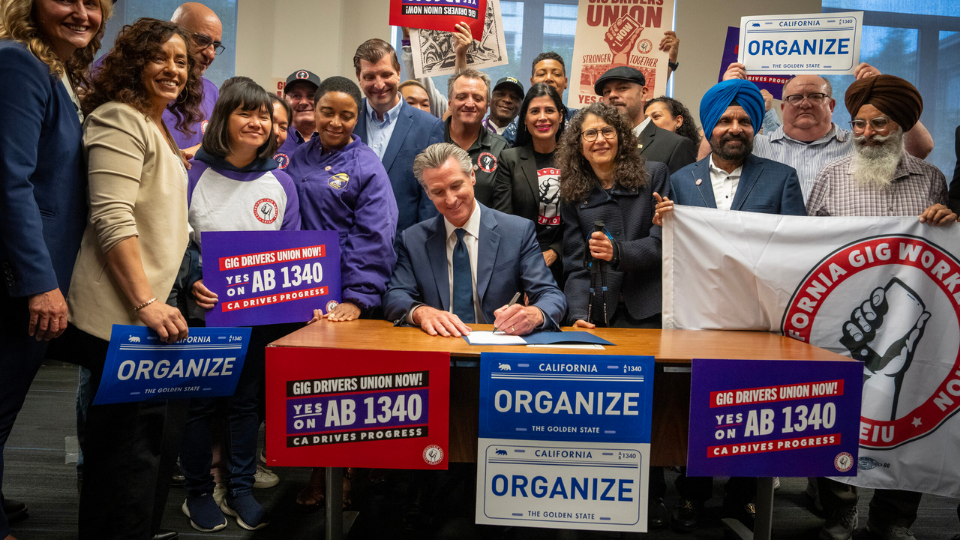
Governor Gavin Newsom, joined by organized labor, signed into law landmark legislation that strengthens labor rights for rideshare drivers.| Gov.ca.gov
SACRAMENTO —Workers and unions in California notched a big win when Democratic Gov. Gavin Newsom signed AB1340, giving an estimated 800,000 rideshare drivers in the Golden State the right to bargain collectively.
In return for agreeing to the law, the top two rideshare companies, Uber and Lyft, extracted one major concession. For legal purposes, the drivers will still be “independent contractors.” That means they may bargain for better wages and working conditions, but may also have to shoulder some costs that “employees” under labor law do not have to pay for.
But the law also requires Uber, Lyft, and similar rideshare firms “to bargain in good faith with unions that represent their drivers,” a fact sheet says. Now it’s up to unions to organize them.
The law is expected to help thousands of rideshare drivers. California Gig Workers United, which has been lobbying for the law—along with the Service Employees and other unions—reports the average Californian rideshare driver nets $9.75 an hour, far less than the state’s minimum wage. And 49% of California ride providers now work for rideshare firms.
California Gig Workers United, Newsom, and Service Employees hailed the law as a major move for workers. Newsom, a potential Democratic presidential hopeful in 2028, added that it directly contradicts the massive federal worker union-busting of the anti-worker GOP Donald Trump regime.
The rideshare drivers’ law was one of two path-breaking pro-worker bills Newsom signed on the same day, October 3. The other gives the California Public Employees Relations Board the power to run union elections, enforce labor law, and judge management-labor disputes in the private sector.
While that law is inspired by the current lack of a quorum at the National Labor Relations Board– thanks to Trump–the new California law covers all conflicts, even when the NLRB is functioning.
Gov. Kathy Hochul, D-N.Y., signed a similar law on September 5, but it kicks in only when the NLRB is in such legal limbo, not all the time.
As for the rideshare law, “WE DID IT!” exulted California Gig Workers United in big block capital letters on its website.
“For 10 years, we’ve been organizing to form a union of gig rideshare drivers in California to win fair wages, real flexibility, meaningful health benefits, and basic worker protections–which gig companies and others spent millions of dollars to deny.
“This year, we won AB1340, a game-changing state law that gives us the right to form a union and bargain with gig rideshare companies like Uber and Lyft.
“AB1340 empowers gig rideshare drivers with the right to unionize and organize for better working conditions, in addition to establishing a democratic process for gig drivers to choose their union.” It also “protects gig rideshare drivers from retaliation when they join together to organize and provides a process for drivers to bargain with rideshare corporations.”
Tia Orr, executive director of SEIU California, also hailed the law—and also took a shot at Trump.
“Trump is gutting workers’ fundamental right to come together and demand fair pay and treatment,” Orr said. “Here in California, we are sending a different message: When workers are empowered and valued, everyone wins. Shared prosperity starts with unions for all workers.”
“At a moment when President Trump and Republicans have triggered a federal government shutdown that forces federal workers to go unpaid and face layoffs, California is proving government can instead support working families,” Newsom said in his own statement.
“Donald Trump is holding the government hostage and stripping away worker protections. In California, we’re doing the opposite: Proving government can deliver—giving drivers the power to unionize while we continue our work to lower costs for families. That’s the difference between chaos and competence.”
“Rideshare drivers are the backbone of the gig economy, and for too long they have been denied the same rights and protections others take for granted,” said Assemblyman Mark Berman, D-Menlo Park, a lead sponsor.
“This new law changes that. They will now have the opportunity to sit at the bargaining table…to negotiate for better pay, safer working conditions, and a voice in the future of their work. This will help raise standards for everyone, because what happens in the gig economy sets the tone for the whole economy.”
We hope you appreciated this article. At People’s World, we believe news and information should be free and accessible to all, but we need your help. Our journalism is free of corporate influence and paywalls because we are totally reader-supported. Only you, our readers and supporters, make this possible. If you enjoy reading People’s World and the stories we bring you, please support our work by donating or becoming a monthly sustainer today. Thank you!
CONTRIBUTOR

